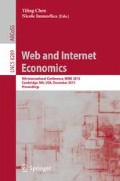Abstract
The focus of classic mechanism design has been on truthful direct-revelation mechanisms. In the context of combinatorial auctions the truthful direct-revelation mechanism that maximizes social welfare is the VCG mechanism. For many valuation spaces computing the allocation and payments of the VCG mechanism, however, is a computationally hard problem. We thus study the performance of the VCG mechanism when bidders are forced to choose bids from a subspace of the valuation space for which the VCG outcome can be computed efficiently. We prove improved upper bounds on the welfare loss for restrictions to additive bids and upper and lower bounds for restrictions to non-additive bids. These bounds show that the welfare loss increases in expressiveness. All our bounds apply to equilibrium concepts that can be computed in polynomial time as well as to learning outcomes.
Access this chapter
Tax calculation will be finalised at checkout
Purchases are for personal use only
Preview
Unable to display preview. Download preview PDF.
References
Bhawalkar, K., Roughgarden, T.: Welfare guarantees for combinatorial auctions with item bidding. In: Proc. of 22nd SODA, pp. 700–709 (2011)
Cesa-Bianchi, N., Mansour, Y., Stoltz, G.: Improved second-order bounds for prediction with expert advice. Machine Learning 66(2-3), 321–352 (2007)
Christodoulou, G., Kovács, A., Schapira, M.: Bayesian combinatorial auctions. In: Aceto, L., Damgård, I., Goldberg, L.A., Halldórsson, M.M., Ingólfsdóttir, A., Walukiewicz, I. (eds.) ICALP 2008, Part I. LNCS, vol. 5125, pp. 820–832. Springer, Heidelberg (2008)
Clarke, E.H.: Multipart pricing of public goods. Public Choice 11, 17–33 (1971)
Dütting, P., Fischer, F., Parkes, D.C.: Simplicity-expressiveness tradeoffs in mechanism design. In: Proc. of 12th EC, pp. 341–350 (2011)
Feldman, M., Fu, H., Gravin, N., Lucier, B.: Simultaneous auctions are (almost) efficient. In: Proc. of 45th STOC, pp. 201–210 (2013)
Foster, D., Vohra, R.: Calibrated learning and correlated equilibrium. Games and Economic Behavior 21, 40–55 (1997)
Fredman, M.L., Tarjan, R.E.: Fibonacci heaps and their uses in improved network optimization algorithms. Journal of the ACM 34(3), 596–615 (1987)
Garey, M.R., Johnson, D.S.: Computers and Intractability: A Guide to the Theory of NP-Completeness. W. H. Freeman and Company, New York (1979)
Groves, T.: Incentives in teams. Econometrica 41, 617–631 (1973)
Hart, S., Mas-Colell, A.: A simple adaptive procedure leading to correlated equilibrium. Econometrica 68, 1127–1150 (2000)
Hassidim, A., Kaplan, H., Mansour, Y., Nisan, N.: Non-price equilibria in markets of discrete goods. In: Proc. of 12th EC, pp. 295–296 (2011)
Jiang, A.X., Leyton-Brown, K.: Polynomial-time computation of exact correlated equilibrium in compact games. In: Proc. of 12th EC, pp. 119–126 (2011)
de Keijzer, B., Markakis, E., Schäfer, G., Telelis, O.: On the inefficiency of standard multi-unit auctions, pp. 1–16 (2013), http://arxiv.org/abs/1303.1646
Kelso, A.S., Crawford, V.: Job matching, coalition formation, and gross substitutes. Econometrica 50, 1483–1504 (1982)
Lehmann, B., Lehmann, D., Nisan, N.: Combinatorial auctions with decreasing marginal utilities. Games and Economic Behavior 55, 270–296 (2005)
Littlestone, N., Warmuth, M.K.: The weighted majority algorithm. Information and Computation 108(2), 212–261 (1994)
Markakis, E., Telelis, O.: Uniform price auctions: Equilibria and efficiency. In: Serna, M. (ed.) SAGT 2012. LNCS, vol. 7615, pp. 227–238. Springer, Heidelberg (2012)
Milgrom, P.: Simplified mechanisms with an application to sponsored-search auctions. Games and Economic Behavior 70, 62–70 (2010)
Murota, K.: Valuated matroid intersection II: Algorithm. SIAM Journal of Discrete Mathematics 9, 562–576 (1996)
Murota, K.: Matrices and Matroids for Systems Analysis. Springer, Heidelberg (2000)
Murota, K., Tamura, A.: Applications of m-convex submodular flow problem to mathematical economics. In: Eades, P., Takaoka, T. (eds.) ISAAC 2001. LNCS, vol. 2223, pp. 14–25. Springer, Heidelberg (2001)
Nisan, N., Roughgarden, T., Tardos, E., Vazirani, V.: Algorithmic Game Theory. Cambridge University Press, New York (2007)
Papadimitriou, C., Roughgarden, T.: Computing correlated equilibria in multi-player games. Journal of the ACM 55, 14 (2008)
Roughgarden, T.: Intrinsic robustness of the price of anarchy. In: Proc. of 41st STOC, pp. 513–522 (2009)
Roughgarden, T.: The price of anarchy in games of incomplete information. In: Proc. of 13th EC, pp. 862–879 (2012)
Syrgkanis, V., Tardos, É.: Composable and efficient mechanisms. In: Proc. of 45th STOC, pp. 211–220 (2013)
Tarjan, R.E.: Data structures and network algorithms. Society for Industrial and Applied Mathematics, Philadelphia (1983)
Vickrey, W.: Counterspeculation, auctions, and competitive sealed tenders. J. of Finance 16(1), 8–37 (1961)
de Vries, S., Bikhchandani, S., Schummer, J., Vohra, R.V.: Linear programming and Vickrey auctions. In: Dietrich, B., Vohra, R.V. (eds.) Mathematics of the Internet: E-Auctions and Markets, IMA Volumes in Mathematics and its Applications, pp. 75–116. Springer, Heidelberg (2002)
Author information
Authors and Affiliations
Editor information
Editors and Affiliations
Rights and permissions
Copyright information
© 2013 Springer-Verlag Berlin Heidelberg
About this paper
Cite this paper
Dütting, P., Henzinger, M., Starnberger, M. (2013). Valuation Compressions in VCG-Based Combinatorial Auctions. In: Chen, Y., Immorlica, N. (eds) Web and Internet Economics. WINE 2013. Lecture Notes in Computer Science, vol 8289. Springer, Berlin, Heidelberg. https://doi.org/10.1007/978-3-642-45046-4_13
Download citation
DOI: https://doi.org/10.1007/978-3-642-45046-4_13
Publisher Name: Springer, Berlin, Heidelberg
Print ISBN: 978-3-642-45045-7
Online ISBN: 978-3-642-45046-4
eBook Packages: Computer ScienceComputer Science (R0)

